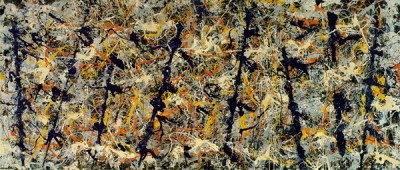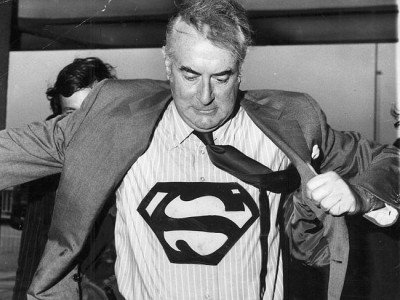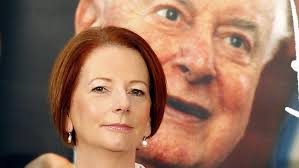Former Labor Prime Minister Gough Whitlam can be remembered for arrogantly wasting Australian taxpayers’ money on buying a boring blue painting called Blue Poles.
$1.3 million was an awful lot of money in 1973. As a teenager back then, it is one’s earliest memories of government mismanagement.
 Screen drip painting hyperbowl
(exclusively upside down)
Screen drip painting hyperbowl
(exclusively upside down)
Card-carrying Liberal Party publicist, Andrew Bolt, isn’t always right, but sometimes he writes a cracker! (Euphemism for we agree with his article – except for his praise of Bob Hawke).
In the New Limited press yesterday, Bolt wrote ‘Whitlam’s large shadow hides many a giant myth‘:
“Gough Whitlam was lucky his government was sacked in 1975. To our cultural elite, that turned him from a failure to a martyr.
That allowed the ruin he caused to gradually become obscured by the giant shadow of his myth. More ominously, it also allowed Labor to gradually forget what it learned, painfully, from Whitlam’s disasters.
So Labor today weeps for Whitlam and much of the media with it. The ABC’s massive coverage in particular has resembled the state-ordered mourning for a socialist dictator.
But how must this astonishing torrent of tears strike most Australians? Fact is, the elite’s verdict of Whitlam — the hero reformer, Great Leader and victim of a conservative conspiracy — has never been shared by most voters.
Aloof and arrogant, Whitlam was no man of the people and no prime minister was shunned by them so comprehensively — twice.
Columnist Miranda Devine better observes his arrogance as a “self-described Great Man, a superb showman with a brilliant wit, charisma and an optimistic disposition, and fantastically good at self-promotion.”
The Whitlam Ventures (1976) accurately described Whitlam as “the quintessence of upper class suburbia … He was pedantically precise of speech, sloppy in action.”
Whitlam ruled chaotically for just two years and 11 months until he was sacked by governor-general Sir John Kerr to end a damaging stalemate in the Senate, where the Opposition had cut off the scandal-racked government’s money.
The Left raged at the dismissal. On Monday, hours before Whitlam died, prize-winning author Peter Carey was still spluttering on the ABC that his sacking was a wicked conspiracy — “the US government destabilised and helped overthrow our elected government”.
But at the election the public wholeheartedly backed Kerr’s verdict, destroying Labor in a 44 per cent to 56 wipeout. Whitlam the martyr — bellowing “maintain the rage” — nevertheless held on to the Labor leadership, convinced he’d be seen in time as more sinned against than sinning. Instead, two years later the public made clear to Whitlam that he really, really wasn’t wanted, rejecting Labor again by another massive margin, 45 to 55.
There’s no sign that the public’s damning verdict ever changed.
The reason is simple. Whitlam may have had big dreams, but voters prefer to live their own.
What they value most are not the kind of grand gestures that had mourners this week ringing talkback to say Whitlam made them “proud to be Australian” — recognising communist China, demanding joint control of US spy bases here, signing a flurry of international conventions and replacing God Save the Queen with Advance Australia Fair.
[Bring Back Waltzing Matilda as Australia’s National Anthem, written by a legendary Australian]
What counts more is that a prime minister helps Australians to realise their own dreams — of a good job, a house, savings in the bank and proper schooling for the children, with work at the end of it.
But Whitlam gave them only as much — or as little — as a Big Government man can, quadrupling spending on health and education and letting wages explode by 28 per cent in a single year. Money fell from the sky. But Whitlam had little care for where it came from — so little, that the Labor Party even negotiated with Saddam Hussein’s Baath socialist party for a $500,000 loan to fight the 1975 election.
The disaster was inevitable. With the Budget blown and the international oil shock hitting a weakened economy, the Whitlam government saw unemployment nearly triple, the tax take double, the deficit blow out and inflation soar to almost 20 per cent.
Many Australians lost their jobs, their business, savings, dreams and hated Whitlam for what he’d done to them. A new generation of pragmatic Labor leaders — notably Bob Hawke — learned from the debacle. Whitlam was shunned and Hawke ministers used “Whitlamite” as the ultimate insult directed at colleagues who promised big government schemes with no care for the cost.
For these new leaders, the books had to balance and the workplaces had to tick over. It wasn’t romantic work, yet it made Hawke the great prime minister Whitlam never was. [Crap, “there was no end to (Hawke’s) vanity.” – David Lange]
But how far Labor has fallen. A new Whitlam emerged four decades later with Kevin Rudd, a leader with the same grandiose schemes and reckless spending, the same debt blowouts, the same incompetence, the same rising dole queues. In every way Rudd’s national broadband scheme is Whitlamite. Then Julia Gillard, an unrepentant Whitlamite, simply made things worse.
If only that were all. But Labor has forgotten other lessons it once learned from Whitlam’s fall — and many voters have forgotten, too.
Like many on the Left, Opposition Leader Bill Shorten this week praised Whitlam particularly for bringing in universal healthcare and giving people a bigger “shot at university”.
What Shorten didn’t actually spell out was that Whitlam had recklessly made both doctors’ visits and universities free. These “free” goodies, paid for by taxpayers, helped kick off our welfare culture, and later governments of both sides, alarmed by their cost, have tried to wind back Whitlam’s signature schemes.
The Hawke government reintroduced university fees and for a while brought in a Medicare co-payment, until public fury forced it to back down. Even today, the Abbott Government is trying to free us from Whitlam’s welfarism. Battling another Labor debt, it is trying to make students pay more for their degrees and plans its own Medicare co-payment.
YES, Whitlam made ambitious changes widely accepted as good, bringing in need-based funding for schools, transferring Crown lands to traditional owners, allowing no-fault divorce, legislating for equal pay for women, ending gerrymanders, decriminalising homosexuality and getting sewerage systems to many suburbs. He blew fresh air into power’s musty corridors and to many made Australia seem bigger, broader and brighter.
But other “reforms” came at a cost we’re haven’t yet counted. Whitlam outlawed racial discrimination, but those laws inevitably expanded to shut down debates on racial “identity” and preferments and fed a grievance industry that has empowered a million activists, lawyers and other bullies.
He adopted multiculturalism, only to encourage a dangerous new tribalising of Australia.
 And this lot can travel on Australian Passports
And this lot can travel on Australian Passports
And that is the third lesson from Whitlam’s mistakes that Labor unlearned and even the Liberals seem to be forgetting with a race-based change to the Constitution.
All reforms have unintended consequences and should be judged not by what was intended but what was actually achieved — and at what cost. Whitlam had grand dreams but too often the price was the smashing of the dreams of the people he was elected to serve.
No, more modest leaders suit Australia best and hang around longest. They are the leaders who know Australians wish to live their own dreams and not those of their prime minister.
To those Australians, Whitlam was the big-spending menace on the hill and not at all their martyred saviour.”
“Still, whatever ails the Left, it excels at myth-making. Gough Whitlam made a much better legend than a prime minister.” – Miranda Devine.
Gough Whitlam led a chaotic big-spending government for less than three years between 1972 and 1975, reaching high farce in the shady Khemlani Loans Affair, and ending when he was dismissed by the governor-general and lost the ensuing election in a catastrophic landslide. That’s the truth.
In fact the best thing that ever happened to Whitlam was to be dismissed from office, because he became a Labor martyr, and never had to account for the devastation he wrought on his country and his party.
The arrogance of Labor’s mythmakers would have us believe Australia was a terrible country before Whitlam. Whitlam is crucial to Labor lore because they think it proves theirs is the party of “enlargers” and reformers, whereas the Liberals are just agents of resistance.”
 Communist Narcissism that spawned the Hawke, Keating, Rudd trilogy
Communist Narcissism that spawned the Hawke, Keating, Rudd trilogy
One recalls vividly a by-chance bumping into the 6 foot 3″ suited man back in 2007. The Westfield tower lift door opened and the big man using his walking frame barged into the lift pushing me aside, and I searched for any notice that proclaimed that lift to be private.
It was for the public, and arrogant Gough then 91, was still for himself.
Gough Whitlam: a martyred man of myths? No. Gough’s greatness was for Gough.
The bully Whitlam was a cunning short-term exploiter, nothing more is his legacy.
Now that Whitlam’s corrosive legacy has been interred, bring out the White Knight fish oil to restore Traditional Australia, pre-Whitlam!
- Bring back National Service
- End Immigration
- End Multiculturalism
- Treat Totalitarian China the same as North Korea
- Restore Waltzing Matilda as our National Anthem.

